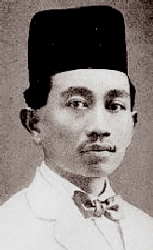 (The present controversy regarding the true identity of the MILF negotiator known only as Iqbal brings to mind an important episode in Philippine history during the Philippine Commonwealth concerning Dutch East Indies (later Indonesian) patriot Tan Malaka and his life as an unregistered Filipino in Manila, hobnobbing with the city’s society .)
(The present controversy regarding the true identity of the MILF negotiator known only as Iqbal brings to mind an important episode in Philippine history during the Philippine Commonwealth concerning Dutch East Indies (later Indonesian) patriot Tan Malaka and his life as an unregistered Filipino in Manila, hobnobbing with the city’s society .)
BY PHILIP VICTORIA – As the Filipino nation breathes a sigh of relief and gratitude to the Indonesian government for granting Mary Jane Veloso a reprieve from execution, few people know that ninety years ago, Filipinos also fought for Indonesian revolutionary Tan Malaka’s right to stay in the Philippines to prevent his extradition and prosecution by the Dutch authorities. In 1927, none other than the future Philippine Chief Justice Jose Abad Santos and his legal team defending Malaka during the latter’s deportation proceedings. Santos was Secretary of Justice up until the Cabinet Crisis of 1923 and later reappointed in 1928, of which he served in various capacities.
Malaka arrived in the Philippines in July 1925 using the name Elias Fuentes and with the help of Filipino leaders such as Francisco Varona, secured work as a corres-pondent for the newspaper El Debate. His decision to move to Manila was due to his belief that his health would improve in a climate he was accustomed to. A few months later, Alimin- a fellow PKI member- requested a meeting in Manila regarding the PKI decision to mount an uprising in Indonesia in 1926. Alimin safely arrived in Manila in February 1926 through the ‘appropriate secret arrangements’ Malaka made through his Filipino friends.
Concluding that the rebellion will fail due to its un-preparedness, he sent Alimin back to Singapore to present his response before the PKI leadership in-exile with a view to holding an emergency meeting. When Alimin failed to reply, Malaka set out for Singapore in May 1926.
His immediate problem was getting ‘a good false passport; good in the sense that the paper and stamps were authentic, but false because the bearer would not really be a Filipino. What else could I do? In opposing imperialism, which is not based on honesty, one cannot always use honest methods, parti-cularly when aiming to destroy that imperialism.’ Nonetheless, he was able to get one ‘after a high-ranking Filipino official gave his surety.’ He entered Singapore under the name Hasan Gozali, ‘who came from Mindanao’ and by being ‘calm and patient’ was able to clear immigration checks. He notes that he also previously used another alias Estahislau (Estanislao) Rivera in Singapore.
Despite Malaka’s recom-mendation, the PKI went ahead with its revolt and was crushed by the Dutch. Malaka returned to Manila via Thailand in August 1927. He was arrested by the secret police not long after, his cover blown and faced deportation. The Dutch were keen to prosecute him for the failed revolt. A group led by University of Manila president Apolinario de los Santos assured him of counsel ‘under the direction of Jose Abad Santos.’ He was released on bail and allowed to stay at the university hostel.
In Malaka’s view, his case and the trial that followed ‘unexpectedly functioned as a dividing element among the Philippine population’ with his supporters fighting for his right of asylum while detractors called him ‘Javanese Red’. Abad Santos’ team insisted during the trial that Malaka was arrested without a warrant. Political leaders led by Manuel Quezon, the trade union federation Legionario de Trabajo and students from the University of Manila and the University of the Philippines weighed in their support. Even the Indian Muslim community in Manila collected some money for him. This show of solidarity ‘was as if [the Filipinos] were recalling the atmosphere that existed under the Spanish tyranny.’
The initially sympathetic Acting Governor General Eugene Gilmore responded to the growing mass action by calling Abad Santos ‘in the middle of the night’ proposing that Malaka quietly and voluntarily leave the Philippines for Amoy (Fujian), China via a Filipino-owned ship. It was a better alternative than getting arrested in British Hong Kong or the Dutch in Indonesia. Malaka recounts the response:
‘Dr. Jose Abad Santos was completely taken aback and did not want to accept the proposal… When the national-ist lawyer held fast to his initial position, the imperialist lawyer answered with a threat: ‘If Tan Malaka does not go quietly we shall proceed on another case, which will involve not only Tan Malaka, but will drag in several of the most prominent people in the Philippines.
‘My defense lawyer was forced to give in. He knew that what was alluded to was the means by which my passport had been obtained, which could be regarded as a falsification of public document. At about 1:00 AM, he described to me the situation that I had to consider. Because it would no longer be a case of defending a right and because it would involve other people who had given help sincerely and with good intentions, I was forced to accept the ungentle hint that I leave the Philippines.’
According to him, a government informant working at the El Debate offices was responsible for his arrest. After the mole reportedly got paid for his services, he was killed while riding his motorcycle. He mused: ‘Filipinos who believe in supernatural powers regarded this accident as his just punishment.’
Malaka was deported on August 23, 1937, never to return to the Philippines. The Dutch never got to arrest and prosecute Malaka because of Filipinos fought for his right to stay.







Leave a Reply